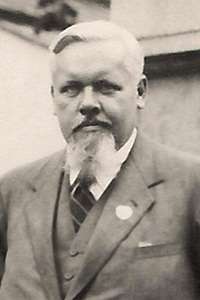Oskar Anderson
Oskar Johann Viktor Anderson (Russian: Оскар Николаевич Андерсон, romanized: Oskar Nikolaevič Anderson; 2 August [O.S. 21 July] 1887] – 12 February 1960) was a Russian-German mathematician of Baltic German descent. He is best known for his work on mathematical statistics and econometrics.
Oskar Anderson | |
|---|---|
 Oskar Anderson in Tartu (around 1930) | |
| Born | Oskar Johann Viktor Anderson 2 August [O.S. 21 July] 1887 |
| Died | February 12, 1960 (aged 72) |
| Nationality | German, Bulgarian, Russian |
| Alma mater |
|
| Known for | Variate Difference Method |
| Spouse(s) | Margarethe Natalie von Hindenburg-Hirtenberg[1] |
| Scientific career | |
| Fields | |
| Institutions | |
| Thesis | (1912) |
| Academic advisors | Alexander Alexandrovich Chuprov |
Life
Anderson was born from a Baltic German family in Minsk (now in Belarus), but soon moved to Kazan (Russia). His father, Nikolai Anderson, was professor in Finno-Ugric languages at the University of Kazan.[2] His older brothers were the folklorist Walter Anderson and the astrophysicist Wilhelm Anderson.[3]
Oskar Anderson graduated from Kazan Gymnasium with a gold medal in 1906. After studying mathematics for one year at the University of Kazan, he moved to St. Petersburg to study economics at the Polytechnic Institute.[4][5] From 1907 to 1915, he was Aleksandr Chuprov's student and assistant. In 1912 he married Margarethe Natalie von Hindenburg-Hirtenberg,[1] a granddaughter of Wilhelm Paul von Hindenburg-Hirtenberg[6] who was commemorated in "The Funeral of 'The Universal Man'" in Dostoyevsky's A Writer's Diary, and started lecturing at a commercial school in St. Petersburg while also studying for a law degree at the University of Saint Petersburg, graduating in 1914.[1]
In 1918 he took on a professorship in Kiev but he was forced to flee Russia in 1920 due to the Russian Revolution, first taking a post in Budapest (Hungary) before becoming a professor at the University of Economics at Varna (Bulgaria) in 1924.
Anderson was one of the charter members of the Econometric Society,[7] whose members also elected him to be a fellow of the society in 1933.[8][7] In the same year he also received a fellowship from the Rockefeller Foundation.[9]
Supported by the foundation, in 1935 he established and became director of the Statistical Institute for Economic Research at the University of Sofia.[10] For the remainder of the decade he also served the League of Nations as an associate member of its Committee of Statistical Experts.[11]
In 1942 he joined the Kiel Institute for the World Economy as head of the Department of Eastern Studies and also took up a full professorship of statistics at the University of Kiel,[1] where he was joined by his brother Walter after the end of the second world war. In 1947 he took a position at the University of Munich, teaching there until 1956, when he retired.
Writings
- Einführung in die Mathematische Statistik, Wien : Springer-Verlag, 1935, ISBN 978-3-7091-5873-9 [12]
- Über die repräsentative Methode und deren Anwendung auf die Aufarbeitung der Ergbnisse der bulgarischen landwirtschaftlichen Betriebszählung vom 31. Dezember 1926, München : Bayer. Statist. Landesamt, 1949
- Die Saisonschwankungen in der deutschen Stromproduktion vor und nach dem Kriege , München : Inst. f. Wirtschaftsforschung, 1950
External links
- Jörg Siebels; Kerstin Nees. "Oskar Anderson". Christian-Albrechts-Universität zu Kiel, Famous scholars from Kiel. Retrieved 2018-10-26.
- Newspaper clippings about Oskar Anderson in the 20th Century Press Archives of the ZBW
References/Further reading
- Strecker, Heinrich; Strecker, Rosemarie (2016). "Oskar Anderson". Encyclopedia of Mathematics. Springer-Verlag GmbH, Heidelberg.
- "Формулярный списокь (service record): Николай Андерсон (Nikolai Anderson)", Oskar Nikolaevich Anderson (1907-1912) (in Russian), St. Petersburg: Archives of the Petrograd Polytechnical Institute of the Emperor Peter the Great in the Central State Historical Archives of St. Petersburg, pp. 9–18, retrieved 2018-10-27
- Рафикова (Rafikova), Г. (G.); Ибрагимова (Ibrahimova), Ф. (F.) (2016). "Биографика Казанского университета: Андерсоны (Kazan University Biography: Anderson)". Гасырлар авазы – Эхо веков (in Russian). 2016 1/2.
- Оскар Николаевич Андерсон (1907-1912) / Oskar Nikolaevich Anderson (1907-1912) (in Russian), St. Petersburg: Archives of the Petrograd Polytechnical Institute of the Emperor Peter the Great in the Central State Historical Archives of St. Petersburg, TsGIASpb 478 1 64, retrieved 2018-10-27
- Андерсон Оскар Николаевич - стипендиат (1912-1914) / Oskar Nikolaevich Anderson - scholarship holder (1912-1914) (in Russian), St. Petersburg: Archives of the Petrograd Polytechnical Institute of the Emperor Peter the Great in the Central State Historical Archives of St. Petersburg, TsGIASpb 478 23 5, retrieved 2018-10-27
- Снапкоўскі, Юрый (2016). "ГІНДЭНБУРГІ, ПАСТОРЫУСЫ дэ ГІНДЭНБУРГІ (HINDENBURG, PASTORYUS de HINDENBURG) герба «БРОХВІЧ I»". Гербоўнік беларускай шляхты (in Belarusian). 4. pp. 372–379.
- Fels, Eberhard (1961). "Oskar Anderson, 1887-1960". Econometrica. 29 (1): 74–79. doi:10.2307/1907689. JSTOR 1907689.
- "In Memoriam". List of Deceased Fellows of the Econometric Society. Retrieved April 4, 2019.
- Faure, Justine (2012), The Rockefeller Foundation Fellows in Social Sciences: Transnational Networks and Construction of Disciplines — The Example of East Central Europe, Rockefeller Archive Center
- Avramov, Roumen (September 2018). "Chapter 1: From Nationalization to Nowhere. Ownership in Bulgarian Economic Thought (1944–1989)". In Kovács, János Mátyás (ed.). Populating No Man's Land: Economic Concepts of Ownership under Communism. Rowman & Littlefield. pp. 23–46. ISBN 978-1-4985-3921-0.
- "Report of Work in the Social Sciences". The Rockefeller Foundation Annual Report 1937 (PDF) (Report). The Rockefeller Foundation. 1938. p. 258. Retrieved 2018-11-07.
- Anderson, Oskar N. (1935). Einführung in die Mathematische Statistik (in German). Springer-Verlag Wien. doi:10.1007/978-3-7091-5923-1. ISBN 978-3-7091-5923-1. Zbl 0012.11104.
- Menges, Günter (1965). "Das Werk Oskar Andersons". FinanzArchiv / Public Finance Analysis. New Series (in German). 24 (1): 126–130. JSTOR 40909833.
- Sheynin, O.B. (1970). "Anderson, Oskar Johann Viktor". Dictionary of Scientific Biography. 1. New York: Charles Scribner's Sons. pp. 154–155. ISBN 978-0-684-10114-9.
- O'Connor, John J.; Robertson, Edmund F. (May 2000), "Oskar Johann Viktor Anderson", MacTutor History of Mathematics archive, University of St Andrews.